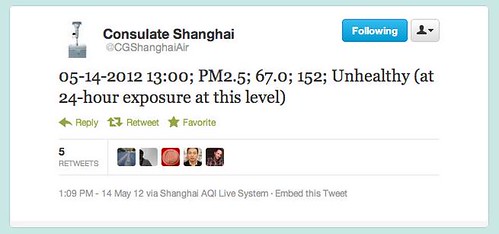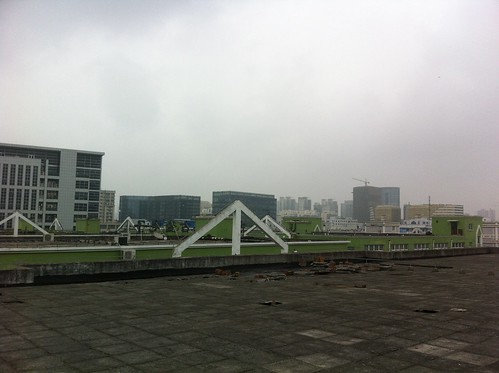A couple of months ago I wrote an article on air pollution in Shanghai, and afterward I received quite some mails from people planning to move here who got worried about the air quality in Shanghai. At least one person told me he decided not to move to China, but I am sure that because of the air quality a lot more people already made that decision. And I personally know several people that left Shanghai because of the air quality – and like I said in the article, I will probably also not stay here for years anymore, especially because of the pollution.
When I wrote the post there were no official 2.5PM measurements available yet, but not the US Consulate started broadcasting them on Twitter (just like they already do this in Beijing). After last night’s rain and seemingly pretty clean air today (it even rains a bit right now), I was shocked to see that even on a day like this the air quality is unhealthy. The pictures with this post were taken just now on the roof of unitedstyles, often the view is much less clear.
The air quality measurement device is located on Huaihai Lu in downtown Shanghai, so the air there is likely more polluted than in the suburbs, but it’s scary anyway. Of course I immediately started following the pollution levels on Twitter, you can follow them here as well.



Following too right away. I am wondering; if the US consulate can install PM 2.5 equipment up and working in no time, why Shanghai (Beijing and other) governments need several months to ‘test and fine tune’ their PM 2.5 equipment. Two possibilities. One is that they want to let the people slowly get ‘used’ to the upcoming bad measurements. Second is that I am afraid they want to make it possible to ‘fine-tune’ the results of the measuring if the air quality is too bad or doesn’t meet the ‘required’ clean air days in a year. Both the consulate in Shanghai as well as the Embassy in Beijing will make it difficult to hide the real facts.
Hoi Marc, ik vind de luchtverontreiniging in Shanghai ook steeds meer verontrustend, en dan heb ik het nog niet eens over de zware industriele gebieden in China waar ik regelmatig kom, daar ben ik dan slechts een dag of een paar uur, maarja woon al wel jarenlang in Shanghai en mijn kinderen ook, wat ik nog veel erger vindt. Vraagje hoe kan ik op twitter komen,zodat ik die polution ook kan volgen, heb het een paar keer geprobeert maar lukt mij niet in China. Bedankt voor je suggesties/hulp. Groeten Jan Willem
@Jacques I guess both your guesses may be right. Everybody living in Shanghai’s big cities knows the readings will likely be bad, so they try to delay giving them out or they try to find ways to make them look better.
@Jan Willem The easiest way to access Twitter is through a VPN, there are many commercial ones available online (best is to find one with many different gateways, so you can change the VPN from one city to another if one gets blocked). If you know anybody with some technical knowledge you can ask that person to set up a personal server for you outside China and make a connection from China to that server and surf through there. If you only want to see these tweets you can also use a non-Chinese cell phone (if you have one) and go online though 2.5G or 3G, in that case Twitter won’t be blocked.
Now available on US Consulate Website:
http://shanghai.usembassy-china.org.cn/airmonitor.html
Today at noon, Horror…
5/15/2012 12:00:00 PM
05-15-2012 12:00; PM2.5; 152.0; 202; Very Unhealthy (at 24-hour exposure at this level)
@Eric, …and that despite the fact that it is sunny (well, the sun is trying to shine through the smog/clouds).
Marc thanks, I will follow your suggestions.
For those like me who refuse to pay for
VPN and use twitter, the US consulate website DOES publish directly but it’s
under “News and Events”. Now if I could
just get this data easily into database
or spreadsheet. I still run here in Shanghai(near SAS) but would like to limit it
during worst days and not run at times
of day that are worst.
If we’re going to be serious about stopping air pollution, can we please stop pretending that bicycle paths and electric cars are a solution?